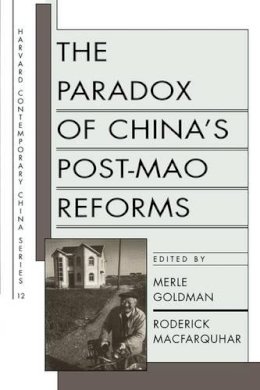
The Paradox of China's Post-Mao Reforms: 12 (Harvard Contemporary China Series)
. Ed(S): Goldman, Merle; Macfarquhar, Roderick
China’s bold program of reforms launched in the late 1970s—the move to a market economy and the opening to the outside world—ended the political chaos and economic stagnation of the Cultural Revolution and sparked China’s unprecedented economic boom. Yet, while the reforms made possible a rising standard of living for the majority of China’s population, they came at the cost of a weakening central government, increasing inequalities, and fragmenting society.
The essays of Barry Naughton, Joseph Fewsmith, Paul H. B. Godwin, Murray Scot Tanner, Lianjiang Li and Kevin J. O’Brien, Tianjian Shi, Martin King Whyte, Thomas P. Bernstein, Dorothy J. Solinger, David S. G. Goodman, Kristen Parris, Merle Goldman, Elizabeth J. Perry, and Richard Baum and Alexei Shevchenko analyze the contradictory impact of China’s economic reforms on its political system and social structure. They explore the changing patterns of the relationship between state and society that may have more profound significance for China than all the revolutionary movements that have convulsed it through most of the twentieth century.
Product Details
About . Ed(S): Goldman, Merle; Macfarquhar, Roderick
Reviews for The Paradox of China's Post-Mao Reforms: 12 (Harvard Contemporary China Series)
Arnold Beichman
Washington Times
The economic reforms in China have had very complex, sometimes contradictory, effects. There has been no suitable volume to which one could turn for a complete view. This work contains a comprehensive, up-to-date treatment of the reforms by leading scholars in the field.
Parks M. Coble, University of Nebraska An excellent overview of the key areas of impact of economic reform on the Chinese polity and social groups through the eighties and more particularly in the nineties. Its focus on the non-economic aspects of reform is welcome as discussions of economic reform have tended to dominate compendiums in recent years. However, the book takes the economic reforms seriously and shows how they have impacted on the Party-state, affected notions of representation, restructured relations between the Party-state and society, and affected different social groups. It is an impressive tour de force of the reforms and their impacts and will be most welcome reading not only for the China specialist but also for those interested in transitions from communist rule in particular and from authoritarian regimes more generally.
Anthony J. Saich, The Ford Foundation
